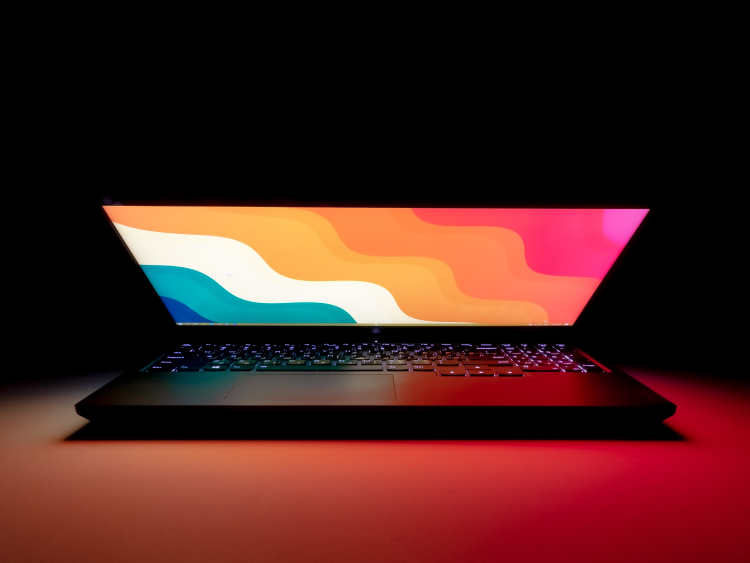The Science of Blue Light: How It Disrupts Your Sleep

Blocking blue light might improve your sleep dramatically. Limiting blue light exposure can provide many health benefits that are very accessible. AUP students seeking to get a good night's sleep during finals may want to restrict their blue light exposure, so what exactly is it?
Visible light is made up of electromagnetic waves measured with nanometers. Nanometers, sometimes called waves, are used to measure the intensity of light sources, as humans can only detect between 380-700 nanometers. Lights with longer waves emit less energy than those of shorter waves. The shorter the wavelength the higher the energy and the more significant effect it has on human eyes. In the simplest form, blue light has shorter waves meaning it emits stronger energy.
Blue light is found in 1⁄3 of all lights that are visible to humans. The largest source of blue light comes from the sun. The predicament of blue light largely stems from artificial blue light sources such as smartphones, TVs, fluorescent lights and LEDs. An excessive amount of blue light consumption from artificial sources can hinder eyesight and produce eye strain and fatigue.
The benefit of absorbing blue light is that it aids in regulating our circadian rhythm. The circadian rhythm is the biological process that is responsible for regulating alertness and sleep to an extent. Too much exposure to blue light can have a negative effect on your circadian rhythm.
Blocking blue light in ways you can control 2-3 hours before sleeping is recommended. However, I have noticed that my sleep quality has improved more than I thought it after wearing blue light glasses whenever I work on my laptop or looked at my phone.
A Harvard article on blue light indicated that blue light negatively affected sleep because it interfered with circadian rhythm. Circadian rhythm is a biological process that lasts for 24 hours and is responsible for regulating alertness and sleep. So in summary, exposure to blue light affects circadian rhythm which can, in turn, affect the sleep cycle. Fret not, blue light damage is dependent on the duration of consumption so effects on people will vary.
The International Journal of Ophthalmology published a journal which concluded that blue light affects circadian rhythm as well as the cornea and retina; two integral parts of the eye. This is due to the fact that the cornea is responsible for absorbing light into the eye. The retina converts light into energy that is sent from the optic nerve to the brain. Excessive blue light exposure can damage the retina but also affect circadian rhythm. There have been arguments in the past that support blue lights and its effects on circadian rhythm. Exposure to blue light can help one to feel awake and is necessary in some treatments of eye diseases. However, everything should be taken in moderation.
The blue light in sunlight will not cause a person to have disturbances in sleep. However, LED metro signs, TV lights, lamps, phones and laptops can have significant effects hours before sleeping. This is because viewing blue light at night makes our circadian rhythm attempt to regulate our bodies into thinking that it's daytime when more energy is required. The blue light stops the production of melatonin and as a result, makes us more awake. Try doing exercises for your eyes to avoid feelings of strain.
Better sleep quality and a decrease in eye strain are the significant benefits of the use of blue light glasses or filters. There are a number of ways to decrease blue light consumption a few hours before bed. Firstly, as already mentioned, there are blue light lenses that can be added to an existing glasses frame. I bought a glass frame separately, then got blue light-blocking lenses added to them. There is also software that eliminates the blue light in your laptop, check the display setting in your computer settings to see how you can adjust it.
Blue light can effectively be managed by avoiding overexposure through laptop filters, blue light glasses and minimizing blue light before bed. Total blocking of blue light during the day, especially in the morning, can add alertness and energy so finding an equilibrium between exposure levels is key.
Sofia Quintero, an AUP alumna shares her experience with blue light glasses. “I first tried blue light glasses during the Covid-19 pandemic. Since we quickly switched to being online all the time my eyes and head started to hurt every day and decided to try out blue light glasses because they began to trend on every social media page.” The rise of blue light glasses use during Covid made Quintero rely more on the glasses every day. Quintero said, “I did notice a difference, and my head started to hurt less and less every time. Now, three years later, I still wear them whenever I have to stare at a screen for too long and I love them!”
Whether or not you are still skeptical, it’s worth a try to see how blue light glasses affect your eyes, especially if you are working at a screen all day.
Disclaimer: No content in this article should be used as a substitute for direct medical advice from your doctor or another qualified clinician.







